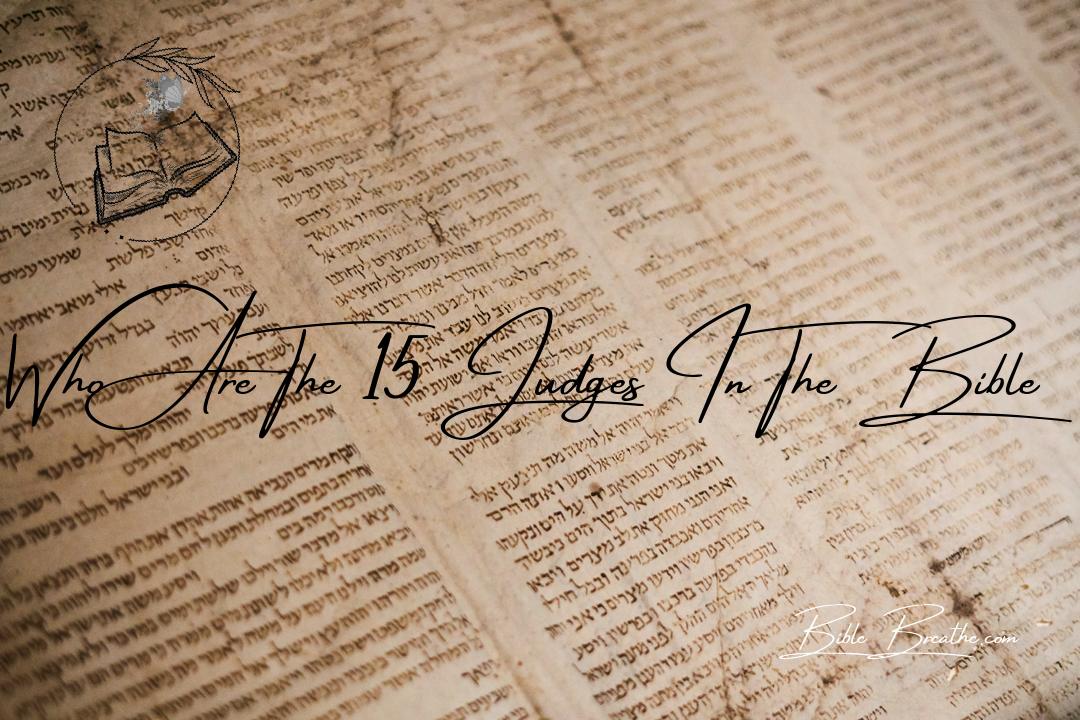Who are the 15 judges in the Bible?
Now, that’s like unearthing hidden treasures in the Good Book, my friends.
These judges, well, they were more than just leaders; they were the heavenly quarterbacks of Biblical governance in ancient Israel.
Imagine it like this: You’ve got Othniel, a wise coach calling the plays, leading his team to victory.
And then there’s Ehud, the southpaw star, making those game-changing moves nobody saw coming.
And what about Deborah, the prophet who was like the playbook and the coach rolled into one?
Then there’s Gideon, who was looking for divine signs like we search for Wi-Fi signals.
And don’t even get me started on Samson, the guy was the Arnold Schwarzenegger of his time, except with long hair.
But hold on, these judges weren’t just on the field; they were in the spiritual locker room too.
You had Eli and Samuel, anointed and ready to bring the Spirit’s A-game.
In those days, Israel was like a bunch of rowdy tribes, facing off against the mean Philistines and those pesky Canaanites.
It was a battlefield, both on the ground and in the soul.
So, as we dive into these judges’ stories, remember, they aren’t just tales.
They’re our history, our spiritual journey, and our playbook for navigating life’s toughest games.
These judges, my friends, they’re more than just ancient legends; they’re our guides, showing us how to score touchdowns in the game of faith.
🏈🙏
Key Takeaways
-
The significance of the judges in Israel’s history: The judges in the Bible played a pivotal role in the history of Israel. They were charismatic leaders, chosen by God, who rose to guide and deliver the Israelites during times of crisis and oppression. Understanding their significance helps us grasp the cyclical nature of Israel’s history and God’s faithfulness in providing leadership when needed.
-
Lessons to be learned from their leadership: The judges exemplify various leadership qualities and characteristics, including faith, courage, and reliance on God’s guidance. Their stories offer valuable lessons on resilience, obedience to God’s commands, and the importance of repentance and turning back to God in times of trouble.
-
The impact of their decisions on Israel’s destiny: The judges’ decisions and actions had a profound impact on Israel’s destiny. Their leadership often led to periods of peace and prosperity, but when they or the people strayed from God’s ways, it resulted in cycles of turmoil and oppression. These historical accounts underscore the consequences of obedience and disobedience to God’s commands.
-
The study of the judges in the Bible invites us to reflect on the broader theme of divine providence and God’s plan for His people. It illustrates how God raises up leaders to guide His chosen nation and highlights the importance of faith and fidelity in maintaining a strong relationship with God.
-
By exploring the stories of the 15 judges in the Bible, individuals can gain insight into the complexities of human leadership, the role of faith in shaping destinies, and the enduring lessons that these historical accounts offer for contemporary believers and leaders alike.
The 15 Judges: God’s Unique Squad
Photo modified by BibleBreathe.com. Original photo by Unseen Histories on Unsplash
Let’s journey back in time, way back to the era of judges in Israel.
Imagine it like a playlist of leaders, each with their own unique beats, ruling the nation before kings were in vogue.
“Back then, kings were missing from the scene, and everyone kinda did their own thing.” – Judges 21:25 (KJV)
God had a different DJ spinning the tunes during this period—judges.
No crowns, just divine selection.
Why?
It was God’s way of showing off His sovereignty and teaching His people the value of keeping His promises.
This era was a rollercoaster of triumphs and struggles, illustrating life before the monarchy.
A Diverse Crew: The 15 Judges
Picture them like a diverse playlist, each tune unique.
From Othniel, the fierce warrior, to Deborah, the wise and prophetic judge, and from Gideon with his fleece to the strongman Samson, their stories are like chart-toppers in Israel’s history.
Some of these judges had unexpected beginnings.
Like Ehud, who was left-handed, a trait that played a vital part in his mission to rescue Israel.
These judges weren’t wearing crowns; they were God’s instruments, picked to guide and shield His people in rocky times.
Facing the Music: Challenges and Spiritual Leadership
In those times, Israel was caught in a loop—sin, oppression, repentance, and rescue.
The judges played the role of turning the music, providing spiritual leadership and a guiding rhythm.
Eli and Samuel, part of this judge lineup, were also priests, keeping an eye on the spiritual vibe of Israel.
This was a time of tribal beats, where each judge rose to the stage facing their tribe’s unique challenges.
They held tight to the covenant, defended against foes like the Philistines and Canaanites, and made sure the one true God was in the spotlight at the Tabernacle, where the Ark of the Covenant threw its spotlight.
As we dive into this musical era of judges and groove with these 15 extraordinary folks who guided Israel, we discover a mixtape of history, faith, and God’s direct involvement.
These judges weren’t just leaders; they were God’s instruments, jamming out His plans and promises, showing His forever commitment to His people.
Let’s keep this playlist on repeat, folks!
The Marvelous Tapestry of Divine Leadership: Meet the 15 Judges of Israel
Photo modified by BibleBreathe.com. Original photo by Chris Linnett on Unsplash
You ever had a canvas splashed with vibrant colors, each stroke telling a story?
Well, that’s the Bible’s narrative of Israel’s history, adorned with the tales of remarkable individuals known as judges.
Picture this: God, the divine artist, intricately weaving together a tapestry of leadership through these 15 judges, all contributing to a magnificent masterpiece.
Othniel: The Valiant Defender
Now, Othniel, he was a real fighter, like stepping into the ring with the odds stacked against you.
God picked him as the first judge, and man, did he show up!
He faced off against the oppressive king of Mesopotamia, securing a knockout victory and ruling Israel like a champ for 40 years.
Othniel set the stage, showing us that when the going gets tough, God raises champions.
Ehud: The Left-Handed Trickster
Ever heard of playing your cards left-handed?
Ehud did just that.
He had a unique advantage and used it wisely, outsmarting the Moabite king Eglon and freeing Israel from Moabite oppression.
Talk about thinking outside the box!
Ehud’s tale teaches us that God equips His chosen servants with precisely what’s needed to tackle their mission.
Shamgar: The Unlikely Hero
Shamgar’s story might be short, but it’s packed with a punch.
Armed only with an ox-goad, he took down six hundred Philistines.
Can you imagine?
It reminds us that sometimes it’s not about the fancy gear, but about God’s power working through even the humblest instruments.
Deborah: Wisdom Personified
Deborah, now she was a beacon of wisdom and leadership.
When Israel needed guidance, she was there, a prophetess and judge, leading the charge against the Canaanite oppressors alongside Barak.
Her legacy still shines, telling us that true leadership knows no gender.
Gideon: The Doubting Warrior
Gideon, oh boy!
His journey was like a rollercoaster ride, from doubt to unshakable faith.
God transformed him from a skeptic to a warrior, leading Israel to a jaw-dropping victory against the Midianites.
But, hey, Gideon stumbled too, reminding us of the thin line between faith and faltering.
Abimelech: A Tragic Tale of Ambition
Abimelech, now that’s a story of misplaced ambition.
He wanted a kingship that went against God’s plan, and it all went downhill from there.
His reign was marked by strife and violence, showing us the consequences of straying from God’s divine order.
Tola and Jair: The Quiet Watchmen
Tola and Jair might not be in the spotlight, but they provided stability and leadership when Israel needed it.
Sometimes, you don’t need the flash and bang to make a difference.
They show us that quiet, faithful service can have a lasting impact.
Jephthah: A Tragic Vow
Jephthah’s story is a mix of honor and tragedy.
A hasty vow, made in desperation, led to heartbreaking sacrifice.
It’s a tough lesson about the power of words and the importance of thoughtful promises.
Ibzan, Elon, and Abdon: Unsung Heroes
Ever heard of Ibzan, Elon, and Abdon?
They might not be in the headlines, but they ruled Israel successively, keeping the peace.
Their humble but steadfast contributions teach us that you don’t need the spotlight to make a lasting impact.
Samson: Strength and Redemption
Samson, oh, he had the strength, but he also had some serious battles with temptation.
His story shows us the dangers of worldly enticements but also the possibility of divine forgiveness and redemption even after great failure.
Eli: The Dedicated Priest
Eli wore two hats: judge and priest.
He was dedicated to God’s house, but he faced family troubles due to lack of discipline.
His life teaches us about the responsibilities and challenges of spiritual leadership.
Samuel: Prophet and Leader
Samuel, the final judge, was a prophet and a leader.
He anointed Saul and David, steering Israel into a new era.
His dedication and faith left a lasting mark, reminding us that God raises up leaders to guide us through transitions.
These 15 judges’ stories in the Bible are more than just history.
They’re like God’s brushstrokes on the canvas of time, showing His faithfulness and His power to use imperfect vessels for His divine purposes.
Each judge, flaws and all, contributed to God’s redemptive plan for His people, reminding us that even in the toughest times, God raises up leaders to guide us towards His light.
These judges, flawed but faithful, are a testament to God’s enduring love and His commitment to His people throughout history.
Keep the faith, for God’s masterpiece is still in the making.
Judges in the Mix: Crafting Israel’s Fate
Photo modified by BibleBreathe.com. Original photo by Tingey Injury Law Firm on Unsplash
Let’s open the pages of history and zoom in on the judges of Israel, the true MVPs whose diverse roles rocked the spiritual, political, and social stages, molding the nation’s destiny in ways you won’t believe.
Let’s break down this epic saga.
Spiritual Superstars
Picture this: the judges were like the ultimate connectors, hooking up the people with God.
They weren’t just about politics; they were spiritual MVPs.
They stood in the gap, keeping the divine hotline open, making sure the Israelites kept their date with worship at the Tabernacle, where the Ark of the Covenant was chillin’.
Political Game-Changers
Back in the day, when the nation of Israel was dealing with some serious external threats, these judges stepped up as the true game-changers.
When enemies like the Philistines, Moabites, and Canaanites were playing rough, these judges took charge, delivering Israel from the oppression.
It was like they had a direct line to divine strategy, ensuring Israel’s safety.
Society’s Referees
But hold up, they weren’t just spiritual and political dynamos; they were also the referees of society.
Imagine them blowing the whistle on chaos and making the calls for justice.
In a society that often teetered on the edge of lawlessness, these judges kept things in check.
Disputes got settled, and social harmony was their jam.
Shaping the Israelite Tale
This was the time when the judges had the spotlight, shaping Israel’s fate like master composers.
They played the tune that kept the twelve tribes in harmony, preventing a discordant split.
Their guidance was the bridge that helped Israel go from a loose-knit crew to a monarchy, with King Saul and later, King David.
But here’s the real kicker.
The judges didn’t just fade away.
Their legacy echoed through time, shouting out messages of faith, resilience, and the need for God’s touch.
Their stories, with all their ups and downs, became timeless lessons for the ages, teaching us the value of staying true to God’s plan and the vital role of strong, principled leaders.
As we look back at these judges and the part they played, it’s clear they weren’t just history’s extras.
They were the instruments God used to conduct His masterpiece, steering and crafting the fate of Israel.
Their stories still drop beats of inspiration, reminding us that faith, solid leadership, and God’s grand design are forever in style in the human story.
Let’s keep spinning this record, folks!
Frequently Asked Questions (FAQs) About Who Are The 15 Judges In The Bible
Why were there 15 judges in Israel?
There were 15 judges in Israel because they served as leaders and deliverers during periods of crisis.
The Book of Judges in the Bible describes various judges who helped guide and protect the Israelites.
Their number might symbolize the need for diverse leadership during turbulent times.
How did the judges differ from kings?
Judges were appointed by God to lead Israel temporarily, usually in times of crisis.
They didn’t inherit power or establish dynasties like kings.
Instead, they delivered Israel from specific threats and then returned to a normal life.
Kings, on the other hand, ruled continuously and often passed down their position to their descendants.
What were the major challenges faced by the judges?
The Judges faced several challenges, including idolatry, foreign oppression, internal conflicts, and a lack of strong leadership.
They contended with recurring cycles of apostasy and deliverance, striving to maintain Israel’s faithfulness while facing external and internal threats to their identity as a nation under God’s guidance.
How did the period of the judges influence Israel’s future?
The period of the judges in Israel’s history, as depicted in the Book of Judges, was marked by cycles of disobedience and deliverance.
These events shaped Israel’s understanding of the need for a king and set the stage for the establishment of the monarchy.
{
“@context”: “https://schema.org”,
“@type”: “FAQPage”,
“mainEntity”: [
{
“@type”: “Question”,
“name”: “Why were there 15 judges in Israel?”,
“acceptedAnswer”: {
“@type”: “Answer”,
“text”: “There were 15 judges in Israel because they served as leaders and deliverers during periods of crisis. The Book of Judges in the Bible describes various judges who helped guide and protect the Israelites. Their number might symbolize the need for diverse leadership during turbulent times.”
}
},
{
“@type”: “Question”,
“name”: “How did the judges differ from kings?”,
“acceptedAnswer”: {
“@type”: “Answer”,
“text”: “Judges were appointed by God to lead Israel temporarily, usually in times of crisis. They didn’t inherit power or establish dynasties like kings. Instead, they delivered Israel from specific threats and then returned to a normal life. Kings, on the other hand, ruled continuously and often passed down their position to their descendants.”
}
},
{
“@type”: “Question”,
“name”: “What were the major challenges faced by the judges?”,
“acceptedAnswer”: {
“@type”: “Answer”,
“text”: “The Judges faced several challenges, including idolatry, foreign oppression, internal conflicts, and a lack of strong leadership. They contended with recurring cycles of apostasy and deliverance, striving to maintain Israel’s faithfulness while facing external and internal threats to their identity as a nation under God’s guidance.”
}
},
{
“@type”: “Question”,
“name”: “How did the period of the judges influence Israel’s future?”,
“acceptedAnswer”: {
“@type”: “Answer”,
“text”: “The period of the judges in Israel’s history, as depicted in the Book of Judges, was marked by cycles of disobedience and deliverance. These events shaped Israel’s understanding of the need for a king and set the stage for the establishment of the monarchy.”
}
}
]
}




